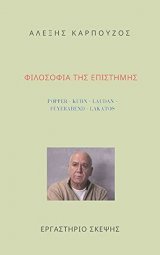ΦΙΛΟΣΟΦΙΑ ΤΗΣ ΕΠΙΣΤΗΜΗΣ - ΑΛΕΞΗΣ ΚΑΡΠΟΥΖΟΣ
Η φιλοσοφία της επιστήμης διέπεται τόσο από λόγο όσο και από αντίλογο, το ένα άκρο του επιστημολογικού φάσματος καταλαμβάνουν οι σχετικιστικές θέσεις και το άλλο άκρο οι ρεαλιστικές θέσεις. Οι σχετικιστικές θέσεις κατά κανόνα αποδίδουν σε μη ορθολογικούς παράγοντες, ιστορικούς, κοινωνικούς, πολιτικούς, υποκειμενικούς (ενδεχομενικούς) την συγκρότηση της επιστημονικής γνώσης και οι ρεαλιστικές θέσεις, κατά κανόνα, αποδίδουν τη συγκρότηση της επιστημονικής γνώσης σε ορθολογικούς παράγοντες (φυσικούς και αναγκαίους). Γράφουμε, κατά κανόνα, γιατί πέραν των ακραιφνών δογματικών σχετικιστικών και ρεαλιστικών θέσεων υπάρχουν και ενδιάμεσες επιστημολογικές αποχρώσεις, οι οποίες διατυπώνουν μετριοπαθείς θέσεις και διάθεση συμφιλίωσης των αντιθέσεων.
Οι παραπάνω επιστημολογικές αντιθέσεις νοηματοδοτούνται στο πλαίσιο του δογματικού πυρήνα του Λόγου (μεταφυσικής προέλευσης), ο οποίος αντιπαραθέτει τον Άνθρωπο και τον Κόσμο, την Φύση και την Ιστορία, το Ορθολογικό με το Μη Ορθολογικό στοιχείο της Ν
Genre: Essay, History, Philosophy, Science, Self help
Genre: Essay, History, Philosophy, Science, Self help
- Year:
- 2012
- 167 Views
Η φιλοσοφία της επιστήμης διέπεται τόσο από λόγο όσο και από αντίλογο, το ένα άκρο του επιστημολογικού φάσματος καταλαμβάνουν οι σχετικιστικές θέσεις και το άλλο άκρο οι ρεαλιστικές θέσεις. Οι σχετικιστικές θέσεις κατά κανόνα αποδίδουν σε μη ορθολογικούς παράγοντες, ιστορικούς, κοινωνικούς, πολιτικούς, υποκειμενικούς (ενδεχομενικούς) την συγκρότηση της επιστημονικής γνώσης και οι ρεαλιστικές θέσεις, κατά κανόνα, αποδίδουν τη συγκρότηση της επιστημονικής γνώσης σε ορθολογικούς παράγοντες (φυσικούς και αναγκαίους). Γράφουμε, κατά κανόνα, γιατί πέραν των ακραιφνών δογματικών σχετικιστικών και ρεαλιστικών θέσεων υπάρχουν και ενδιάμεσες επιστημολογικές αποχρώσεις, οι οποίες διατυπώνουν μετριοπαθείς θέσεις και διάθεση συμφιλίωσης των αντιθέσεων. Οι παραπάνω επιστημολογικές αντιθέσεις νοηματοδοτούνται στο πλαίσιο του δογματικού πυρήνα του Λόγου (μεταφυσικής προέλευσης), ο οποίος αντιπαραθέτει τον Άνθρωπο και τον Κόσμο, την Φύση και την Ιστορία, το Ορθολογικό με το Μη Ορθολογικό στοιχείο της Νόησης, την Αναγκαιότητα με την Ενδεχομενικότητα, δηλαδή με το Μη Ορισμένο, το Απρόσμενο και Εμβόλιμο στοιχείο.
Translation
Translate and read this book in other languages:
Select another language:
- - Select -
- 简体中文 (Chinese - Simplified)
- 繁體中文 (Chinese - Traditional)
- Español (Spanish)
- Esperanto (Esperanto)
- 日本語 (Japanese)
- Português (Portuguese)
- Deutsch (German)
- العربية (Arabic)
- Français (French)
- Русский (Russian)
- ಕನ್ನಡ (Kannada)
- 한국어 (Korean)
- עברית (Hebrew)
- Gaeilge (Irish)
- Українська (Ukrainian)
- اردو (Urdu)
- Magyar (Hungarian)
- मानक हिन्दी (Hindi)
- Indonesia (Indonesian)
- Italiano (Italian)
- தமிழ் (Tamil)
- Türkçe (Turkish)
- తెలుగు (Telugu)
- ภาษาไทย (Thai)
- Tiếng Việt (Vietnamese)
- Čeština (Czech)
- Polski (Polish)
- Bahasa Indonesia (Indonesian)
- Românește (Romanian)
- Nederlands (Dutch)
- Ελληνικά (Greek)
- Latinum (Latin)
- Svenska (Swedish)
- Dansk (Danish)
- Suomi (Finnish)
- فارسی (Persian)
- ייִדיש (Yiddish)
- հայերեն (Armenian)
- Norsk (Norwegian)
- English (English)
Citation
Use the citation below to add this book to your bibliography:
Style:MLAChicagoAPA
"ΦΙΛΟΣΟΦΙΑ ΤΗΣ ΕΠΙΣΤΗΜΗΣ - ΑΛΕΞΗΣ ΚΑΡΠΟΥΖΟΣ Books." Literature.com. STANDS4 LLC, 2024. Web. 23 Apr. 2024. <https://www.literature.com/book/%CE%A6%CE%99%CE%9B%CE%9F%CE%A3%CE%9F%CE%A6%CE%99%CE%91_%CE%A4%CE%97%CE%A3_%CE%95%CE%A0%CE%99%CE%A3%CE%A4%CE%97%CE%9C%CE%97%CE%A3_-_%CE%91%CE%9B%CE%95%CE%9E%CE%97%CE%A3_%CE%9A%CE%91%CE%A1%CE%A0%CE%9F%CE%A5%CE%96%CE%9F%CE%A3_1621>.




Discuss this ΦΙΛΟΣΟΦΙΑ ΤΗΣ ΕΠΙΣΤΗΜΗΣ - ΑΛΕΞΗΣ ΚΑΡΠΟΥΖΟΣ book with the community:
Report Comment
We're doing our best to make sure our content is useful, accurate and safe.
If by any chance you spot an inappropriate comment while navigating through our website please use this form to let us know, and we'll take care of it shortly.
Attachment
You need to be logged in to favorite.
Log In